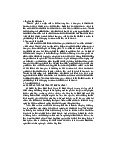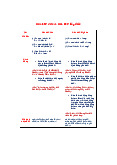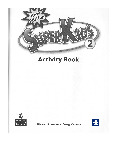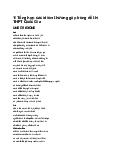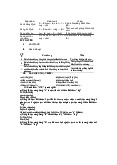























Preview text:
�㷖 Pathways 2_Unit 1 TABLE OF CONTENT UNIT 1: HAPPINESS 3 READING & WRITING 4
Think, Discuss and Explore 4 Reading 1 5 1. Pre-reading 5 2. While-reading 5 3. Post-reading 6 Video 7 1. Pre-viewing 7 2. While-viewing 7 3. Post-viewing 8 Reading 2 9 1. Pre-reading 9 2. While-Reading 9 3. Post-reading 10 1. Pre-writing 11 2. While-writing 11 3. Post-writing 12 UNIT 1: HEALTHY LIVES 13 LISTENING AND SPEAKING 13 Explore the theme 13 1. Vocabulary Activation 14 2. Vocabulary Building 14 3. Vocabulary in Use 14 LISTENING A 16 1. Pre-Listening 16 2. While-Listening 16 3. Post-Listening 16 VIDEO 18 1.Pre-viewing 18 2. While-viewing 18
[FOR INTERNAL USE AT VAN LANG UNIVERSITY ONLY] - page 1
�㷖 Pathways 2_Unit 1 3. Post-viewing 18 VOCABULARY B 20 1. Vocabulary Activation 20 2. Vocabulary Building 20 3. Vocabulary in Use 20 LISTENING B 21 1. Pre-listening 21 2. While-listening 21 3. Post-listening 21 SPEAKING B 22 1. Pre-speaking 22 2. While-speaking 22 3. Post-speaking 23 FINAL TASK: HEALTHY HABITS 24 ANSWER KEY 25
[FOR INTERNAL USE AT VAN LANG UNIVERSITY ONLY] - page 2
�㷖 Pathways 2_Unit 1
�㷖 Pathways 2_Unit 1 UNIT 1: HAPPINESS READING & WRITING
Think, Discuss and Explore
Task 1: Work in pairs. Discuss the following questions.
1. What springs to your mind when you hear the word 2. Would you describe yourself as a happy person? Why (not)?
3. What kinds of things can make you happy?
4. What do you like to do when you are happy?
5. Are you happy when living in Vietnam? Why (not)?
Task 2: Complete Exercises B-C (p.2-3).
[FOR INTERNAL USE AT VAN LANG UNIVERSITY ONLY] - page 4
�㷖 Pathways 2_Unit 1 Reading 1 1. Pre-reading
Task 1: Complete Exercises A-B-C (p.4). 2. While-reading
Task 1: Complete Exercises A-D (p.7).
Task 2: Read the text again and choose the correct answer.
1. What is the main idea of the passage?
a. The answer to happiness is having a simple life.
b. Poorer people are happier than wealthy people.
c. The recipe for happiness is work and friends and family.
d. People can be happy for very different reasons.
2. Why does the author focus on Singapore and Mexico in the passage?
a. They are very similar countries.
b. Most people in those countries are unhappy.
c. Most people in those countries are wealthy.
d. Their people are happy in very different situations.
3. According to the passage, what a. tax breaks b. housing and employment c. laws against littering d. topped-up incomes
4. According to the passage, why is personal freedom considered less important to people in Singapore?
a. They are happy about the strict laws.
b. They are hopeful and confident.
c. They prefer feeling safe and secure. d. They fear the government.
5. Which of these does NOT describe how people socialize in Mexico?
a. People enjoy going for dinner in expensive restaurants with their friends.
b. People are happier when they can appreciate simple joys.
[FOR INTERNAL USE AT VAN LANG UNIVERSITY ONLY] - page 5
�㷖 Pathways 2_Unit 1
c. People feel more connected when they talk to their neighbors.
d. When people spend time with family and friends, they feel happier.
6. According to the passage, why are poor people in Mexico generally happy?
a. They don’t like expensive items. b. They feel safe and secure.
c. They are in a similar situation to their neighbors.
d. They have jobs and enough to eat. 3. Post-reading
Task 1: Complete the sentences with your own ideas.
1. I think (safety and security/ personal freedom/ socializing) is most important for happiness.
2. I usually socialize about _____ hours a week, and I study about _____ hours a week.
3. I think I would prefer to live in (Singapore/ Vietnam/ Mexico/ (your own idea)) because
__________________________________________________________________________
4. I suppose that the most important factor of being happy is _____________.
5. I believe that __________________________ is the most important factor when people go to work.
Task 2: Work in pairs. Use the information in the reading to compare Vietnam with
either Singapore or Mexico. Criteria Vietnam Singapore (or Mexico) 1. Population 2. Work hours 3. _________ 4. _________
[FOR INTERNAL USE AT VAN LANG UNIVERSITY ONLY] - page 6
�㷖 Pathways 2_Unit 1 Video 1. Pre-viewing
Task 1: Complete Exercises A-B-C (p.9-10) 2. While-viewing
Task 1: Complete Exercises A-B (p.10)
Task 2: Watch the video again and fill in the blanks with the NO MORE THAN
THREE WORDS and/or NUMBERS. 1. There are over
people in the world today and it could be by the year .
2. The populations are getting much older much faster in some places such as: , , and .
3. According to some researchers,
can live for 200 years or more and are known to live for
years or more and elephants are up to years.
4. Humans can live to a maximum of about
. A place that people live longer and
healthier than anywhere else in the world may be found on of Okinawa.
5. The people in Okinawa and Sardinia tend to stay and eat
food while younger people are eating more and
they may be less active than their previous generations.
6. People nowadays think
helps them live longer lives and
some scientists consider aging as a
. However, the secret of longevity is eating
healthy food, staying active and keeping our .
[FOR INTERNAL USE AT VAN LANG UNIVERSITY ONLY] - page 7
�㷖 Pathways 2_Unit 1 3. Post-viewing
Task 1: Work in pairs. Discuss.
1. What are the common things of the centenarians in the video and the people in Singapore and Mexico?
2. In your opinion, how to live healthier and longer? Complete the mind map below. Then,
present your idea to your class.
[FOR INTERNAL USE AT VAN LANG UNIVERSITY ONLY] - page 8
�㷖 Pathways 2_Unit 1 Reading 2 1. Pre-reading Task 1: Work in pairs.
1. Rank the things below from 1-10, with 10 being the thing that makes you the happiest.
Then compare your answers with a partner. After that, list down a few things about each
activity, such as places, times, thoughts, feelings,…
Things that make you happy
More details (places, times, thoughts, feelings, etc.) a. _____ Going on holiday
b. _____ Listening to your favorite music c. _____ Being healthy d. _____ Eating good food
e. _____ Having a lot of money f. _____ Cooking g. _____ Going for a walk
h. _____ Having a happy relationship/ family i. _____ Buying something new j. _____ Passing a test
2. Write two things that make you happy that aren’t in this list. Share with your partner.
Task 2: Complete Exercises A-B-C (p. 11) 2. While-Reading
Task 1: Complete Exercises A-B-C-D (p.14)
Task 2: Fill in the blank with NO MORE THAN THREE WORDS from the reading.
1. According to the study, people who are more to family, friends and
community are happier than those who are less well-connected.
2. One good advice to have a good mood is to be active, go , listen to music and .
[FOR INTERNAL USE AT VAN LANG UNIVERSITY ONLY] - page 9
�㷖 Pathways 2_Unit 1
3. Regarding the factor of money for happiness, instead of buying things like or
, we should spend for something that helps our mental life
such as music lessons or a vacation with family or friends.
4. According to the researcher Michael Norton, the act of donating or supporting money to
someone has a powerful effect on the as well as
and the author David thinks that that makes us happy. 3. Post-reading
Task 1: Write a paragraph (of at least 140 words) about a time when you felt very happy or excited.
Remember to include information such as what happened, when and where it happened, why it
happened and who you were with.
[FOR INTERNAL USE AT VAN LANG UNIVERSITY ONLY] - page 10
�㷖 Pathways 2_Unit 1 Writing 1. Pre-writing
A paragraph is a group of sentences about one topic. Most paragraphs include a sentence
that states the main idea of the paragraph. It should not be too general or too specific. This
sentence is called the topic sentence.
Task 1: Underline the topic sentence for the paragraph below
People find happiness in their working lives in different ways. Firstly, not everyone dreams of
doing a particular job, and it can be equally rewarding to try a variety of professions; starting out
on a completely new career path can be a reinvigorating experience. Secondly, some people
see their jobs as simply a means of earning money, and they are happy if their salary is high
enough to allow them to enjoy life outside work. Finally, job satisfaction is often the result of
working conditions, rather than the career itself. For example, a positive working atmosphere,
enthusiastic colleagues, and an inspirational boss can make working life much more satisfying, regardless of the profession.
Task 2: Read the paragraph of Task 1 again and answer the questions below:
1. How many supporting ideas are there in the paragraph?
2. What are the conjunctions used in the paragraph?
Task 3: Complete the outline for the paragraph of Task 1: Outline Topic sentence: Reason 1: Reason 2: Reason 3: 2. While-writing
Task 1: Write a paragraph of at least 140 words for the topic:
In this modern age, with all the advancements in technology, medicine, and education, many
[FOR INTERNAL USE AT VAN LANG UNIVERSITY ONLY] - page 11
�㷖 Pathways 2_Unit 1
experts believe that people are generally less happy than they used to be. Do you agree with
this view? Say why or why not, providing examples to support your opinion.
Task 2: Complete the writing task on page 18 (SB). 3. Post-writing
Task 1: Exchange your writing with your friends. Read and correct all the
mistakes you can find in their writing.
Task 2: Work in groups. Do you agree with these opinions on happiness? Give your reasons.
1. Money will always make us happy.
2. The older you become, the happier you are.
3. Men are happier than women.
4. It’s hard to be happy in today’s world.
5. We can control our emotions, which means we can choose to be happy or feel miserable.
6. Every country should care more about the happiness level of their citizens.
[FOR INTERNAL USE AT VAN LANG UNIVERSITY ONLY] - page 12
�㷖 Pathways 2_Unit 1 UNIT 1: HEALTHY LIVES LISTENING AND SPEAKING Explore the theme
Task 1: Work in pairs. List 3 healthy activities or habits and 3 things that may
cause your health problems. Give reasons for your answers. 3 healthy habits/ activities:
3 unhealthy things/ activities: - - - - - -
Task 2: Look at the infographic below and answer the questions.
1. What should we do to improve our health?
2. How far would we walk if we took this advice?
3. What effects would it have on our physical health? And our mental health?
Task 3: Complete Explore the theme (p.2).
[FOR INTERNAL USE AT VAN LANG UNIVERSITY ONLY] - page 13
�㷖 Pathways 2_Unit 1 VOCABULARY A 1. Vocabulary Activation
Task 1: Work in pairs. Answer the questions.
1. Do you think you have a healthy lifestyle? Why (not)?
2. Do you have any serious disease?
3. Do you have a lot of stress? Why are you stressed?
4. Do you think it’s easy to start each day with a positive attitude?
5. What is the staple diet of most Vietnamese?
Task 2: Complete Exercises A-B-C (p.4) 2. Vocabulary Building
Task 1: Complete each sentence with the correct form of the words from
Vocabulary Activation - Task 1.
1. Do you think chicken and fish are foods?
2. Is running or walking a better kind of ?
3. My grandmother is 90 and very healthy. I think she’s to live to 100. 4. Ed has a lot of
in his life right now. I think he needs to relax more. 5. George is very
. He can lift 150 pounds! (68 kilograms) 6. The typical Sardinian
includes a lot of fish and fresh vegetables.
7. Eating too many hamburgers can healthy problems. 8. Smoking is a very bad . You should quit.
9. Today a lot of people in the U.S suffer from heart . 10. Larry’s blood
is too low. That’s unusual! 3. Vocabulary in Use
Task 1. List three ideas for each category below. Then share your ideas with your partner.
1. three common causes of stress
___________ ; ___________ ; ___________ 2. three serious diseases
[FOR INTERNAL USE AT VAN LANG UNIVERSITY ONLY] - page 14
�㷖 Pathways 2_Unit 1
___________ ; ___________ ; ___________ 3. three most popular diets
___________ ; ___________ ; ___________
[FOR INTERNAL USE AT VAN LANG UNIVERSITY ONLY] - page 15
�㷖 Pathways 2_Unit 1 LISTENING A 1. Pre-Listening
Task 1: Complete Exercises A-B (p. 6)
Task 2: Work in pairs. Rank these with your partner. Put the best things for your
heart at the top. Give reasons for your rankings. being with friends exercise love laughter medicine vegetables sleep music 2. While-Listening
Task 1: Complete Exercises C-D-E (p.6-7)
Task 2: Listen the audio file again and fill the blanks with NO MORE THAN THREE WORDS and/or NUMBERS.
According to the listening part, the speaker is a (1) and he
shared some ways to prevent heart disease and the first very easy way is checking our (2)
because it is a serious problem and may lead to heart disease. Those
who are overweight need to lose (3) pounds could help this lower.
Several reports from government show that (4) can keep
your weight and your blood pressure better and prevent heart disease. Eating several servings
of vegetables and fruits daily and less (5) is also good for your
heart. Healthy eating also helps us control our (6) . Besides, doing exercise at least (7)
per week may help your heart be
stronger and make you healthier. Last thing we need to do to prevent heart disease is coping with (8)
from your jobs, children. When you feel stressful, you may go for
a walk, practice yoga and then cook a healthy dinner for family or get a (9)
. In sum, eating habits, doing exercise, checking your blood pressure and control (10)
will help you prevent heart disease and live longer. 3. Post-Listening
Task 1: Work in pairs. Discuss the following questions.
1. Do you have a healthy lifestyle that is good for your heart? Why (not)?
[FOR INTERNAL USE AT VAN LANG UNIVERSITY ONLY] - page 16
�㷖 Pathways 2_Unit 1
2. What do you think of when you hear the word 'heart disease'?
3. What do you know about heart attacks?
4. Should we have health training at school? Why (not)?
Task 2: Write a short email (at least 140 words) to the nurse in the listening to
express your opinion about preventing heart diseases. Ask him 3 additional
questions regarding this matter.
[FOR INTERNAL USE AT VAN LANG UNIVERSITY ONLY] - page 17
�㷖 Pathways 2_Unit 1 VIDEO 1. Pre-viewing
Task 1: Work in pairs. Discuss the questions.
1. What do you know about bees?
2. In what ways do bees benefit the environment?
3. In what ways do bees benefit humans?
4. Do you think that bees could help people with some certain illnesses? Why (not)?
5. How would the world be different without bees?
Task 2: Complete Exercises A-B (p.12) 2. While-viewing
Task 1: Complete Exercises D-E (p.13)
Task 2: Watch the video again and decide if the following statements are True (T)
or False (F). Correct the false statements.
1. Hso-rong Chen could not move for half a year because of his sickness.
2. Mr. Chen and his assistants treat 200 patients everyday.
3. Mr. Chen believes that people may look 5 years younger if being stung by 6,000 bees.
4. Mr. Chen used to work for a textile company 30 years ago.
5. Bee stings may relieve arthritis or multiple sclerosis, but could not treat common cold. 3. Post-viewing
Task 1: Work in group. Discuss the question.
Do you think modern or traditional medicine is more effective in treating serious health
problems like heart diseases and cancers? Complete the table with your reasons and examples.
[FOR INTERNAL USE AT VAN LANG UNIVERSITY ONLY] - page 18
�㷖 Pathways 2_Unit 1 Type Pros Cons Traditional medicine Modern medicine
[FOR INTERNAL USE AT VAN LANG UNIVERSITY ONLY] - page 19
�㷖 Pathways 2_Unit 1 VOCABULARY B 1. Vocabulary Activation
Task 1: Complete Exercises A-B (p.14) 2. Vocabulary Building
Task 1: Complete Exercise C (p.15)
Task 2: Work in pairs. Complete each sentence with a word in the box below.
Make any necessary changes. cell contain enter produce respond common defend occur research theory 1. Pollen always the body through the nose.
2. The human body is made of millions of tiny .
3. Being too clean is just one
to explain why people suffer from allergies. 4. An allergic reaction when the body 5. Colombia delicious coffee. 6. Milk
a lot of important vitamins and nutrients. 7. The immune system usually the body against diseases. 8. Scientists are now doing
to learn more about allergies. 9. A cold is a very illness. 10. John usually
to my phone messages by email. 3. Vocabulary in Use
Task 1: Work in group. Answer the questions.
1. What food might cause an allergy?
2. What plants can be allergens?
3. How often do you need to wash your hands, clothes and change sheets if you are allergic?
[FOR INTERNAL USE AT VAN LANG UNIVERSITY ONLY] - page 20
�㷖 Pathways 2_Unit 1 LISTENING B 1. Pre-listening
Task 1: Complete Exercise A (p.16)
Task 2: What do you know about allergies?
1. Do you have allergies or know someone with allergies?
2. What are the most common types of allergies?
3. What are the most common allergens?
4. What might happen during an allergic reaction? 2. While-listening
Task 1: Complete Exercises B-C (p.16)
Task 2: Listen the audio again and decide True (T) or False (F) for the following sentences.
1. Raymond does not know a lot about allergies.
2. Elena is allergic to all kinds of fruits except strawberries, peanuts and chocolate.
3. Both Raymond and Elena have asthma.
4. Raymond hates chocolate and would not like to eat it.
5. Elena thinks that food allergies are more serious than other kinds of allergies.
6. According to Elena, environment and genes are two main factors of food allergies. 3. Post-listening
Task 1: Complete Exercises D-E (p.17)
Task 2: Work in pairs. Discuss the questions.
1. What is the 2. What food are many people allergic to?
3. When did the number of people with food allergies grow quickly?
Task 3: Work in small groups. Research some popular allergies and remedies for
them. Present to your classmates with visual aids.
[FOR INTERNAL USE AT VAN LANG UNIVERSITY ONLY] - page 21
�㷖 Pathways 2_Unit 1 SPEAKING B 1. Pre-speaking
Task 1: Complete Exercises A-B (p.18) 2. While-speaking
Task 1: Work in pairs. Read the structure on page 18. Take turns to choose a
topic and start a conversation with your partner.
Your idea:…………………. Sample dialogue:
A: Let’s talk about interesting places.
B: What interesting places have you visited?
A: Well, I went to Japan with my sister last spring. It was amazing!
B: Really? What did you do there?
[FOR INTERNAL USE AT VAN LANG UNIVERSITY ONLY] - page 22
�㷖 Pathways 2_Unit 1
A: We travelled to many beautiful places and tried different kinds of food. I also climbed Fuji
mountain with a local friend. It was spectacular up there. How about you? Have you been to any interesting place recently?
B: Oh yes. I and my family visited Angkor Wat last year. …. 3. Post-speaking
Task 1: Go around the class and start a conversation with at least two friends,
using the clues below. Then, report some interesting information from your
conversation to your class.
[FOR INTERNAL USE AT VAN LANG UNIVERSITY ONLY] - page 23
�㷖 Pathways 2_Unit 1
FINAL TASK: HEALTHY HABITS
Task 1: Work in pairs. Complete the questionnaire. Do you…? Questions Always Usually Often Sometimes Never You Your friend 1. stay up late when there’s school the next day? 2. use smartphone and/or computer more than 4 hours a day? 3. eat a lot of sweets? 4. sleep about 7-8 hours per night? 5. exercise? 6. drink 2 litters of water a day? 7. feel stressed about school work or relationship?
Task 2: Look at the result of the questionnaire. Do you think you are healthier
than your friend? Why or why not?
Task 3: Work in small groups. Use your own idea and ideas from the
questionnaire to discuss the question: What are some things people can do in
their lives to prevent heart disease?
Task 4: Complete Exercises A-D (p.19-20)
Task 5: Complete the Reflection task on page 20 (SB).
[FOR INTERNAL USE AT VAN LANG UNIVERSITY ONLY] - page 24
